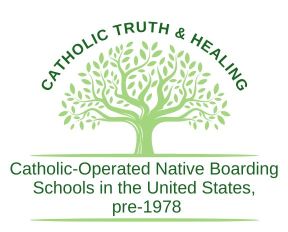There are several ways to navigate this list.
BY STATE
Choose the state you want to research from the left sidebar.
BY SCHOOL
See the list below. Click on the school name that you would like to see their information.
BY SEARCH TERM
Enter a word or phrase into the search bar.
Notes for Using this List:
● The Tribal Nations impacted are listed as they appear in historical documents and may not reflect the names used by the Nations today.
● An asterisk next to the name of a religious community means that the community has verified the dates as accurate.
● This list was last updated on May 5, 2023
Fort Yuma Indian School
Details:
Dates of Operation: 1886–1900
Current Diocese: San Diego
Previous Diocese Involved:
Monterey and Los Angeles, 1886–1900
Religious Orders who worked at the Parish / School:
Sisters of St. Joseph of Carondelet (Los Angeles Province), 1886–1900*
On a Reservation: Fort Yuma Reservation
On the Department of the Interior List: Yes
Tribal Nations Impacted (as listed in historical documents):
Quechan; Yuma
Notes: The United States Army built Fort Yuma in 1851, which was converted in 1884 to a government school run by a Presbyterian teacher. The school was unsuccessful, and the Sisters of St. Joseph assumed control in 1886.
Fort Yuma California
St. Anthony’s Industrial School
Details:
Dates of Operation: 1887–1908
Current Diocese: San Diego
Previous Diocese Involved:
Monterey and Los Angeles, 1887–1908
Religious Orders who worked at the Parish / School:
Sisters of St. Joseph of Carondelet (Los Angeles Province), 1887–1908*
On a Reservation: No
On the Department of the Interior List: Yes
Tribal Nations Impacted (as listed in historical documents):
Campo; Kumiai (Kumeyaay, Diegueno); Luiseno
Notes: In 1887, Rev. Anthony Dominic Ubach, a missionary priest from the Archdiocese of St. Louis, received government funding to open a boarding school for Native children in San Diego. The Monterey and Los Angeles bishop named Fr. Ubach as the school’s superintendent, and the Sisters of St. Joseph of Carondelet were asked to serve as teachers.
San Diego California
St. Boniface Indian Industrial School
Details:
Dates of Operation: 1889–1969
Current Diocese: San Bernardino
Previous Dioceses Involved:
Monterey and Los Angeles, 1889–1922
Los Angeles-San Diego, 1922–1936
San Diego, 1936–1969
Religious Orders who worked at the Parish / School:
Order of St. Benedict (Saint Vincent Archabbey, Latrobe, PA), 1889–1890*
Missionaries of the Precious Blood (United States Province), 1893–1901 (see notes)*
Order of Friars Minor (Province of Saint Barbara), 1921–1952
Sisters of St. Joseph of Carondelet (Los Angeles Province), 1890–1956*
Brothers of St. Jude, 1952–1957
Brothers of Charity of the Immaculate Heart of Mary, 1957–unknown
On a Reservation: No
On the Department of the Interior List: Yes
Tribal Nations Impacted (as listed in historical documents):
Cahuilla; Gabrielino-Tongva; JuanenoKumeyaay; Luiseno; Serrano
Notes: The Benedictine Fathers of Saint Vincent Archabbey in Latrobe, PA, oversaw the land purchase (paid for by the Bureau of Catholic Indian Missions) and construction of the school. In 1890, the bishop of Monterey and Los Angeles asked Fr. Florian Hahn, C.PP.S., to serve as administrator of the school. Hahn was a member of the Missionaries of the Precious Blood, but he served at the school under the direction of the bishop rather than his religious community. In 1902, he became a priest for the Diocese of Monterey and Los Angeles, severing his ties with the Missionaries of the Precious Blood. Priests from the Diocese of Monterey and Los Angeles served at the school until 1921 when the Franciscan Friars took over the administration. In 1952, the Franciscans withdrew from the school and were replaced by priests from the Diocese of San Diego. By 1950, most students were not indigenous, and in 1953 the school officially ceased to be an “Indian” school. The school underwent many name changes beginning in 1952, including New Hope USA School, St. Boniface Boys Town of the Desert, Basil Brewer Boys Town of the Desert, Boys Town of the Desert, and American Boys Ranch. In 1969, the school was moved to a new campus, and in 1974 the original campus at Banning was demolished.
Banning California
St. Turibius Mission School
Details:
Dates of Operation: 1900–1910 (see notes)
Current Diocese: Santa Rosa
Previous Diocese Involved:
San Francisco
Religious Orders who worked at the Parish / School:
Order of Friars Minor (Province of the Sacred Heart), 1900–1910
On a Reservation: No
On the Department of the Interior List: Yes
Tribal Nations Impacted (as listed in historical documents):
Pomo; Wappo; Yuki
Notes: The exact dates the school was in operation are not clear based on available resources, which give different dates for the school’s establishment, the earliest being 1888. Records from the Bureau of Catholic Indian Missions, located at Marquette University, Milwaukee, WI, indicate that the school operated as a boarding and/or day school from 1900 to 1910. It is not known if the school continued to operate after 1910.
Kelseyville California
